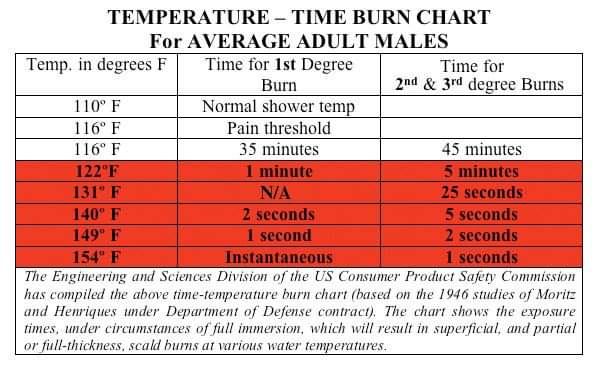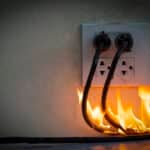Water heaters are the unsung heroes of our homes, diligently providing the hot water we rely on for various daily activities. However, there’s more to a water heater than meets the eye – maintaining the right temperature range isn’t just about comfort; it’s a crucial safety and efficiency concern. In this comprehensive blog post, we’ll take a deep dive into the optimal water heater temperature range, particularly focusing on the recommended 110 – 120 degrees Fahrenheit range. We’ll also explore the reasons why water temperature inspection is an integral part of a home inspection, shedding light on its importance for residents’ well-being and a property’s overall functionality.
The Goldilocks Zone: 110 – 120 Degrees Fahrenheit
Here at Tennessee Inspection Services, we advocate for maintaining a water heater temperature within the range of 110 to 120 degrees Fahrenheit. This seemingly modest range holds significant benefits that impact safety, energy efficiency, and water quality in your home.
- Mitigating Scalding Risks: Water temperatures exceeding 120 degrees can pose a serious risk of scalding, particularly for vulnerable individuals such as children and the elderly. Scalding incidents can result in painful burns and necessitate medical attention. By adhering to the recommended temperature range, homeowners can significantly reduce the likelihood of scalding accidents, creating a safer living environment for everyone.
- Curbing Bacterial Growth: Water temperature has a profound impact on bacterial growth. While overly cold water can encourage the proliferation of harmful bacteria like Legionella – responsible for Legionnaire’s disease – excessively hot water can disrupt the beneficial bacteria balance in the water system. The 110 – 120 degree range strikes a harmonious balance, minimizing the risk of bacterial growth and maintaining water quality that meets health and safety standards.
- Energy Efficiency and Cost Savings: Water heating constitutes a substantial portion of a household’s energy consumption. Running a water heater at high temperatures leads to increased energy usage, as the appliance continuously works to sustain the elevated temperature. Conversely, setting the temperature too low might result in insufficiently heated water, prompting the water heater to cycle more frequently. By sticking to the recommended temperature range, homeowners can optimize energy efficiency, reduce utility bills, and contribute to a more sustainable environment.
Why Water Temperature Inspection Matters During Home Inspections
Tennessee Inspection Services recognizes that the health, safety, and overall well-being of a home’s occupants depend on a well-regulated water heater. Therefore, they prioritize evaluating water temperature as part of their comprehensive home inspection process. Here’s why water temperature inspection is a vital component of the assessment:
- Ensuring Safety: The primary concern of any home inspection is the safety of the residents. By meticulously examining the water heater’s temperature settings, inspectors play a crucial role in preventing scalding accidents. This preventive measure can spare residents from painful injuries and the subsequent physical, emotional, and financial implications.
- Preserving Health: Beyond safety concerns, water temperature inspection addresses health considerations. Detecting and rectifying temperature-related issues can help prevent the growth of harmful bacteria, safeguarding residents from waterborne illnesses and maintaining a high standard of water quality throughout the household.
- Promoting Efficiency and Savings: Home inspections also aim to enhance a home’s energy efficiency. Evaluating water heater temperature enables inspectors to provide homeowners with tailored recommendations on optimizing their water heating systems. This guidance empowers homeowners to make informed decisions that lead to energy savings and reduced utility expenses over time.
Conclusion
In the grand tapestry of homeownership, the water heater plays a pivotal role that should not be underestimated. Tennessee Inspection Services’ steadfast commitment to ensuring water heater temperatures fall within the ideal range of 110 – 120 degrees Fahrenheit demonstrates our dedication to observing a safe, efficient, and comfortable living environment for residents. By adhering to this recommended temperature range and scheduling regular professional inspections, homeowners take a proactive stance in prioritizing safety, health, and sustainability within their households. The seemingly simple act of maintaining the “just right” water temperature can have far-reaching positive effects, echoing Tennessee Inspection Services’ commitment to fostering a better home life for all.






